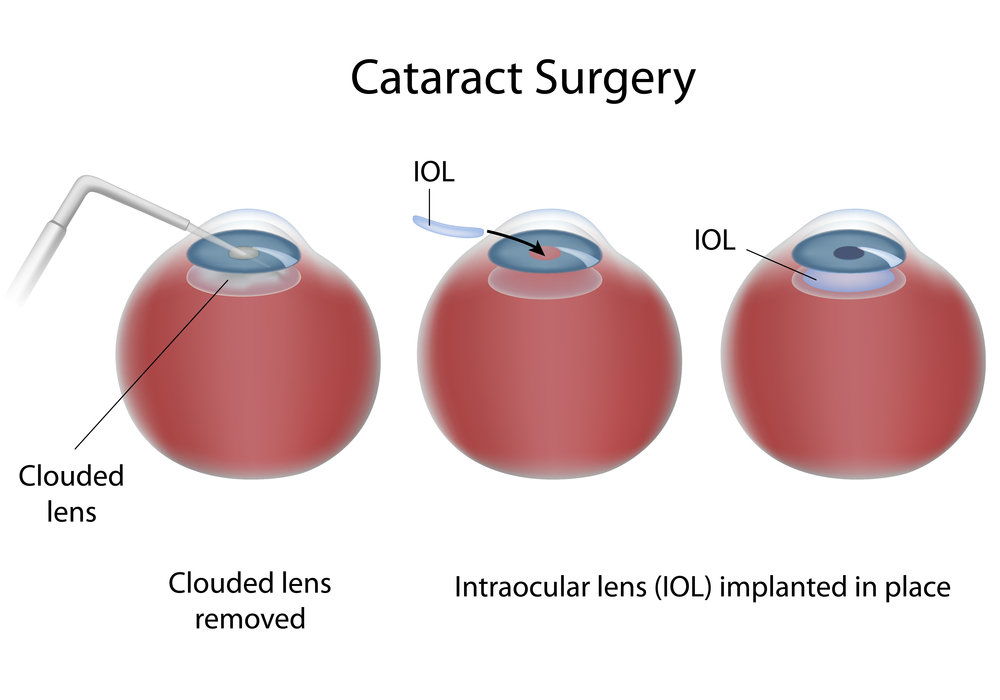Is Cataract Surgery the Only Way to Treat Cataracts?
June 24, 2024
Does it feel like you're looking at the world around you through a foggy or dirty window? Are you noticing that colors have lost their vibrance or look muddier than usual?
These are some of the signs associated with cataracts. If you have cataracts, you're not alone.
Cataracts are one of the most common age-related eye conditions. Most people will develop cataracts at some point in their lives, as half of all adults will have had cataracts by age 75.
However, cataracts tend to develop very slowly, meaning you may have them as early as your forties or fifties. Because they can take a long time to develop, you may not notice them or even realize you have them at first.
They often begin to develop in adults as young as 40 and may not initially cause any noticeable symptoms. Eventually, they can advance to the point that they cause significant problems with vision, requiring intervention.
There is a way to treat cataracts, though. This is through cataract surgery.
Cataract surgery is the only way to treat cataracts and ensure you can see clearly without their debilitating effects. Cataract surgery is minimally invasive and low-risk, and it fully reverses all vision loss from cataracts by removing them completely.
If you have advanced cataracts, cataract surgery can restore your vision and give you back your life. Keep reading to learn why cataract surgery is the only way to treat them!
What are Cataracts?
 A cataract is a clouding of the eye's usually transparent lens, which leads to visual impairment. The natural lens is supposed to be clear so you can see through it, but when a cataract forms, it becomes clouded.
A cataract is a clouding of the eye's usually transparent lens, which leads to visual impairment. The natural lens is supposed to be clear so you can see through it, but when a cataract forms, it becomes clouded.
This cloudiness tends to worsen over time, although it can take years to develop to the point that it interferes with vision. Cataracts usually develop due to aging, and the likelihood of developing them increases as you age.
Cataracts develop slowly as you age and impair your vision and ability to see clearly.
Ready for Cataract Surgery?
Find out if you're a candidate
How Do Cataracts Affect Your Vision?
When cataracts begin to cause visual symptoms, those symptoms include:
- Blurry vision
- Light sensitivity
- Halos and glare
- Poor night vision
- Decreased ability to see color contrast
- Double vision in only one eye
- Injuring yourself more due to increasingly worsening vision
- Frequently changing prescriptions for your glasses and contact lenses
- Noticing colors look muddy or more yellow than before
Experiencing these symptoms is not treatable with visual aids like glasses and contact lenses.
You may be able to reduce the severity of early symptoms with more light and stronger reading glasses, but this effect is only temporary and will not last.
No visual aids can correct vision problems from cataracts. This is because cataracts affect your natural lens.
Think of your lens as a window pane and the cataract as fogginess on the window. The fogginess makes it hard to see through the window.
Nothing will make the window clear again besides removing the fogginess. The only way to remove the fogginess is by having cataract surgery.
When Should You Have Cataract Surgery?
While cataract surgery is the only effective way to treat cataracts, you don't have to have it immediately if you have them. It can take years for cataracts to develop enough for symptoms to become noticeable.
Your ophthalmologist at OMNI Eye Specialists can spot the early signs of cataracts at any regularly scheduled eye exam once they start forming. However, most cataract surgeons only recommend surgery if cataracts are standing in the way of doing basic, everyday tasks or things you love.
Can you no longer make yourself dinner because you can't see clearly? Do you feel like you're socially isolated because cataracts are severely impairing your vision?
Are you no longer able to participate in your favorite hobbies, such as knitting, gardening, or sketching, because of your poor vision? If you answered yes to any of these, it could be a sign that it's time to consider cataract surgery.
Once your cataracts advance to the point that they affect your quality of life due to your inability to see clearly, your ophthalmologist will recommend cataract surgery. Diagnosing your cataracts early is helpful, as your eye doctor can monitor their development.
Since cataract symptoms appear slowly over time, they can be hard to notice at first. Knowing how advanced your cataracts are helps you and your eye doctor know when they negatively impact your life.
Learn More About Cataract Surgery
Schedule a Cataract Consultation!
What to Expect During Cataract Surgery
Cataract surgery is one of the most commonly performed procedures. Because of its frequency, the technology used is streamlined, and complications are very rarely encountered.
Before you have cataract surgery, your cataract surgeon at OMNI Eye Specialists will tell you what to expect during the procedure. During cataract surgery, your cataract surgeon will remove your natural lens, removing the cataract formed on it.
After your natural lens is removed, it's replaced with an intraocular lens (IOL). IOLs are artificial lenses that ensure you can see clearly after cataract surgery.
There are many kinds of IOLs, and you and your cataract surgeon will decide which one you'll have before your surgery. You may choose a premium IOL depending on your visual goals, budget, and lifestyle needs after cataract surgery. These IOLs help reduce your reliance on visual aids after cataract surgery, with some offering the ability to see better than before having cataracts.
Once you have cataract surgery, you can expect a short and easy recovery. More importantly, you can expect to be able to see clearly again.
Regardless of what kind of IOL you choose, cataract surgery can give you your quality of life back by improving your vision and opening your eyes to new clarity! Are you ready to say goodbye to cataracts?
Today, schedule your cataract evaluation at OMNI Eye Specialists in Baltimore, Rosedale, Glen Burnie, and Catonsville, MD! Isn't it time to embrace better vision?



